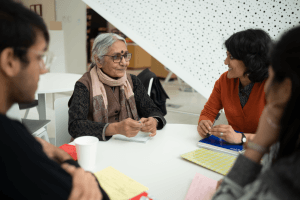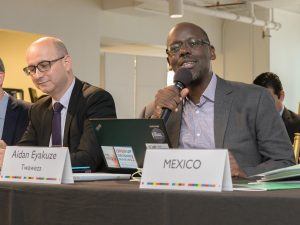Faces of Open Government: Aidan Eyakuze
Rostros del gobierno abierto: Aidan Eyakuze
In December, Aidan Eyakuze and the Government of Italy became the co-chairs of the OGP Steering Committee, laying out a joint agenda to tackle the challenges in the year ahead. Aidan sat down with OGP to share some of the work he and his counterparts in Italy hope to achieve this year and his hopes for the future of the open government community.
Aidan, you have been a member of the OGP Steering CommitteeThe Steering Committee is OGP’s executive decision-making body. Its role is to develop, promote and safeguard OGP’s values, principles and interests; establish OGP’s core ideas, policies, and ru... for six years now and know the needs and challenges facing the Partnership well. What does leading this group of reformers in government and civil society mean to you? What role do you think the Steering Committee can play in enhancing the work of reformers everywhere?
For me it means a fantastic opportunity to work with a group of people who are on a great quest of reforming and improving how governments work with, and for citizens. These are brave, intelligent, passionate people who want to change how governments work domestically, subnationally, and globally.
In realizing this ambitionAccording to OGP’s Articles of Governance, OGP commitments should “stretch government practice beyond its current baseline with respect to key areas of open government.” Ambition captures the po..., I think there are a few roles that the Steering Committee can play. First, it is important to highlight that we are facing an almost existential moment for both the idea and practice of democracy around the world. The growing lack of transparencyAccording to OGP’s Articles of Governance, transparency occurs when “government-held information (including on activities and decisions) is open, comprehensive, timely, freely available to the pub... More, the expanding exclusion of citizens, and the disdain for public accountabilityAccording to OGP’s Articles of Governance, public accountability occurs when ”rules, regulations, and mechanisms in place call upon government actors to justify their actions, act upon criticisms ... More pose serious threats to our social cohesion and collective welfare. Global financial, intellectual and cultural elites will not solve our complex, collective challenges. Fortunately, during the past decade, the Partnership has developed a proven mechanism for how these threats can be dealt with through open, inclusive, and responsive approaches to government.
But we must go further as the OGP Steering Committee. We must make a strong, compelling case for the potency of democracy. This is a very tough challenge under current conditions of a growing, seductive appeal of autocracy. But I think we have to appeal directly to citizens and help them understand the powerful and direct role they can play to make government work better for everyone. We must forge coalitions of reformers within countries and between countries to actualize an effective democratic vision that delivers and improves people’s lives.
What are some areas that require more work and attention from the open government community? What do you hope to achieve in your year as co-chairsThe leadership of the Steering Committee is made up of four co-chairs who provide strategic guidance and support to advance OGP’s overarching priorities. Co-Chairs serve two-year terms beginning on ... to move the needle towards more open and accountable governments?
I’ve been very fortunate to work with the Government of Italy to align our focus areas.
First, we share a conviction to improve the space for civic action. Civic space has been shrinking all over the world, including in OGP countries. The Government of Italy and I are committed to encouraging, advising, and persuading Partnership countries to co-create ambitious commitments to open up civic space, and to make it more conducive for citizens to take active part in policy formulation, execution and evaluation. I shall be co-chairing an OGP Civic Space Learning Network to help push this forward.
Second, we want to promote the open government framework as a great way to improve public service deliveryTo ensure that citizens of all groups are better supported by the government, OGP participating governments are working to improve the quality of and access to public services. Commitments in this are... More for ordinary citizens. This is what matters most to most people. Much more than the niceties of an ideological or a governance framework, it is the tangibility of better schools, hospitals, water and economic opportunity that are most important to citizens. The Government of Italy’s new fifth action planAction plans are at the core of a government’s participation in OGP. They are the product of a co-creation process in which government and civil society jointly develop commitments to open governmen... will focus on how to use the European Union’s Next Generation Funds for an ambitious plan of national resilience and recovery. It will be an excellent opportunity to showcase the relationship between open government and public service delivery to Italians, Europe and the world.
Third, we will look to the future by initiating a dialogue within the Partnership as to “what’s next for OGP’s second decade.” The first decade proved that the OGP mechanism works. Our focus for the next decade will be to transform it from a mechanism to a movement. To do so, we must, in part, deliberately reach out to two main constituencies: young people and business, especially those that are at the influential cutting edge of the world’s digital economy.
I must add my conviction that OGP Local will shape the future of the entire Partnership. That is where the rubber of government performance meets the road of citizens’ expectations. Local government jurisdictions such as cities, counties and regions are where civic space tends to be more open, public service delivery can be improved in tangible ways, and citizens can more effectively hold their governments to account. This year, 50 new local government authorities will join the Partnership, adding to the 76 local jurisdictions that are already members and who are highlighting the vibrancy of the movement.
Last year, OGP marked its ten-year anniversary, taking stock of its successes, lessons learned, and challenges ahead. What do you hope to see from the OGP community in the next decade? What can we do to get there?
I want to see us attract more young people and their incredible energyEnsuring universal access to sustainable, dependable, and affordable energy is critical to every aspect of prosperity. Increasing public oversight and transparency in the energy sector can help to ens... More, ideas and enthusiasm for refreshing democracy around the world, into the Partnership. I hope that many young people in their twenties will be inspired and galvanised by the ideas underlying open government.
Second, I want to see more businesses, and especially the digital platforms, in the Partnership. That’s a particularly hard nut to crack, but we must be creative about the value proposition that we make to business to join the open government movement.
What can we do to get there? A huge part of it is to communicate OGP’s value proposition. We must show how people are benefiting from openness, amplify the innovations happening in local communities, and harness, focus and celebrate the energy released from inviting everyday citizens or civil society to creating and implementing solutions to their challenges.
We can expand the OGP into these two new constituencies to help transform open government ideas and actions into an energised movement for more responsive democratic government around the world.
En diciembre, Aidan Eyakuze y el Gobierno de Italia se convirtieron en los copresidentes del Comité Directivo de OGP, trabajando en una agenda conjunta para atender los retos que representa este año. Aidan platicó con OGP para compartir el trabajo que él y sus contrapartes de Italia esperan lograr este año, así como sus expectativas para el futuro de la comunidad de gobierno abierto.
- Aidan, has sido miembro del Comité Directivo de OGP desde hace seis años y conoces bien las necesidades y retos que la alianza enfrenta. Para ti, ¿Qué significa liderar a este grupo de reformadores de gobierno y la sociedad civil? ¿Qué papel crees que puede desempeñar el Comité Directivo para fortalecer el trabajo de los reformadores de todo el mundo?
Para mí, esta es una oportunidad increíble para trabajar con un grupo de personas que están reformando y mejorando la forma en la que los gobiernos trabajan con y para la ciudadanía. Son personas valientes, inteligentes y apasionadas que quieren cambiar la forma en la que los gobiernos trabajan a nivel nacional, subnacional y global.
En ese sentido, creo que el Comité Directivo tiene varios papeles que desempeñar. Primero, es importante destacar que estamos enfrentando un momento casi existencial para la idea y la práctica de la democracia en todo el mundo. La falta cada vez mayor de transparencia, la creciente exclusión de personas y el rechazo a la rendición de cuentas son amenazas serias a la cohesión social y al bienestar colectivo. Las elites globales financieras, intelectuales y culturales no resolverán nuestros retos colectivos, tan complejos. Afortunadamente, en la última década, la alianza ha desarrollado mecanismos para atender estas amenazas a través de estrategias de gobierno abierto, incluyente y responsable.
Pero, como Comité Directivo, debemos ir más allá. Debemos plantear argumentos sólidos y convincentes sobre el poder de la democracia. Éste es un reto muy complejo que enfrentamos en el marco de una autocracia cada vez más fuerte. Creo que tenemos que apelar directamente a la ciudadanía y ayudarles a comprender el papel poderoso y directo que pueden desempeñar, haciendo que los gobiernos trabajen en beneficio de todas y todos. Debemos crear coaliciones de reformadores al interior de los países y entre ellos para realizar la visión democrática para mejorar la vida de las personas.
- ¿Qué áreas consideras que requieren más trabajo y atención de la comunidad de gobierno abierto? ¿Qué esperas lograr en tu año como copresidente para inclinar la balanza hacia gobiernos más abiertos y capaces de rendir cuentas?
Tengo la fortuna de trabajar con el Gobierno de Italia y estamos alineando nuestras áreas de enfoque. Primero, compartimos la convicción de mejorar el espacio para la acción cívica. El espacio cívico se ha reducido en todo el mundo, incluso en los países de OGP. El Gobierno de Italia y yo estamos comprometidos a promover, asesorar y convencer a los países de la alianza a crear compromisos ambiciosos para abrir el espacio cívico y generar ambientes para que la ciudadanía pueda participar activamente en el diseño, ejecución y evaluación de políticas. Colideraré una red de aprendizaje sobre el espacio cívico en OGP para ayudar a impulsar este trabajo.
Segundo, queremos promover el marco de gobierno abierto como una manera de mejorar la provisión de servicios públicos para la ciudadanía. Esto es lo que más les importa a las personas. Más que los detalles de una ideología o un marco de gobernanza, lo que más le interesa a la ciudadanía son las escuelas, hospitales, el acceso al agua y las oportunidades económicas. El quinto plan de acción del Gobierno de Italia se enfocará en cómo utilizar los fondos Next Generation de la Unión Europea para un plan ambicioso de resiliencia y recuperación. Ésta será una oportunidad excelente para mostrar la relación entre el gobierno abierto y los servicios públicos a las y los italianos, Europa y el mundo.
Tercero, daremos una mirada hacia el futuro, detonando un diálogo al interior de la alianza sobre los siguientes pasos para la segunda década de OGP. La primera década demostró que el mecanismo de OGP funciona. Nuestro enfoque para la siguiente década será transformarlo de un mecanismo a un movimiento. Para ello, debemos colaborar deliberadamente con dos grupos principales: las y los jóvenes y las empresas, especialmente las que están a la vanguardia de la economía digital del mundo.
Quiero agregar mi convicción de que OGP Local definirá el futuro de la alianza. Es a este nivel en donde el desempeño de los gobiernos se junta con las expectativas de la gente. Las jurisdicciones locales como las ciudades, condados y regiones son en donde el espacio cívico tiende a ser más abierto, los servicios públicos pueden mejorar tangiblemente y la ciudadanía puede exigir a sus gobiernos que rindan cuentas de forma más directa. Este año, 50 nuevas autoridades locales se incorporarán a la alianza, uniéndose a las 76 jurisdicciones locales que ya son miembros y que están demostrando la vitalidad del movimiento.
- El año pasado, OGP celebró su décimo aniversario, evaluando sus retos, lecciones aprendidas y retos. ¿Qué esperas de la comunidad de OGP para la siguiente década? ¿Qué podemos hacer para lograr esa visión?
Me gustaría que invitáramos a la alianza a más jóvenes con su increíble energía, ideas y entusiasmo para revitalizar la democracia. Espero que muchas y muchos jóvenes en sus veintes tomen inspiración de las ideas fundamentales del gobierno abierto.
Segundo, me gustaría ver a más empresas, especialmente a las plataformas digitales, en la alianza. Este es un reto especialmente complejo, pero tenemos que buscar formas creativas para hacerles ver el valor de incorporarse a la alianza.
¿Qué podemos hacer para lograrlo? Una gran parte es comunicar la propuesta de valor de OGP. Debemos mostrar que la gente se está beneficiando de la apertura, amplificar las iniciativas innovadoras que se están desarrollando a nivel local y aprovechar, enfocar y celebrar la energía que implica invitar a la ciudadanía y a la sociedad civil a diseñar e implementar soluciones a los retos que enfrentan.
Podemos ampliar a OGP hacia estos dos nuevos grupos para ayudar a transformar las ideas y acciones del gobierno abierto en un movimiento con energía para un gobierno más democrático y responsable en todo el mundo.
Comments (1)
Leave a Reply
Related Content

2021 – 2022 OGP Co-Chair Agenda: Government of Italy and Aidan Eyakuze
The Government of Italy and Aidan Eyakuze's 2021-2022 agenda focuses on incentivizing country-level action, leveraging global and regional fora, and leading OGP into its next decade.
 Challenges and Solutions
Challenges and Solutions
Looking Ahead for OGP: From a Mechanism to a Movement
This year, OGP will also develop a new strategy for the growing Partnership. It is a singular opportunity to apply the lessons learned over the past ten years. We must…

OGP at Ten: Toward Democratic Renewal
When eight governments and nine civil society leaders launched OGP in 2011, no one expected it to reach its current size and scope. Over the last ten years, however, OGP…


Susan Juliet Reply
To drive the OGP commitments and ensure that they are implemented, the participation of young people is critical.
Susan Juliet